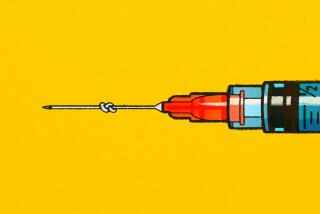Today’s Agenda
- Share via
Why in the world would anybody want to pierce their skin or permanently mark up their bodies with ink?
As more and more teens become fascinated by the latest fads--body piercing and tattooing--more and more parents are worrying, not only about the anti-social aspects, but also about the health effects.
According to Stephanie Suhm of Melrose Tattoo in Hollywood, “A lot of kids sit around in the kitchen or they sit around in the garage and stick each other with needles,” a practice that risks not only infection but diseases including HIV.
When the kids get older and need to find a job, Suhm says, the parents are so upset about the way the homemade tattoos look that they take them to a real tattoo artist. “That’s where a lot of my business comes in. I do a better tattoo over the one everybody hates,” she says.
“There is a very big division between people who see tattooing primarily as an art form who are not necessarily interested in piercing. So it’s not always true that you’ll find pierced parts where you find tattooed parts. (But) rarely does a pierced person not have a tattoo,” she says.
Dr. Paul Levins, assistant professor of dermatology at UCLA and assistant director of the school’s Laser Dermatology Center, and Dr. Karl N. Stein of Sherman Oaks both do a lot of tattoo removal.
Levins says there are basically two types: amateur and professional.
“Amateur tattoos are done with ballpoint pen ink or cigarette ash and water. They make a black ink and with a pen, they put their names or a cross or something like that on. Those are mostly teen-agers or younger people and occasionally gang people.
Many people who got tattoos as young people regret them later, both doctors say.
“Some gave themselves amateur tattoos as teen-agers and now they are schoolteachers or lawyers,” Levins says, adding that he’s even removed tattoos from faces. “I’ve treated a 16-year-old kid with a swastika on his forehead and he can’t get a job at McDonalds and it’s like, ‘I wonder why not.’ ”
Stein says tattoos are anti-social. “When these people go through their phases and they get a little older, they’re still stuck with the tattoos--especially graffiti or gang tattoos.”
Levins says the media has a lot to do with the fascination.
“If you look at the mass media, there are tattoos everywhere--all over television, movies and music videos and advertising. There are young attractive people with tattoos.”
And what about the health effects? Levins says that because tattooing is not government-regulated, information about what the dyes contain is not readily available.
“Some of the very brightly colored inks have metallic substances in them like cadmium, mercury, etc. As far as other health issues, you always have to be concerned about the transmission of viruses like hepatitis or HIV or anything that involves the exchange of blood or body fluids.”
Stein has some words of advice for young people who believe this is the “in” thing: “Just think, just think about the future.”
More to Read
Sign up for Essential California
The most important California stories and recommendations in your inbox every morning.
You may occasionally receive promotional content from the Los Angeles Times.










